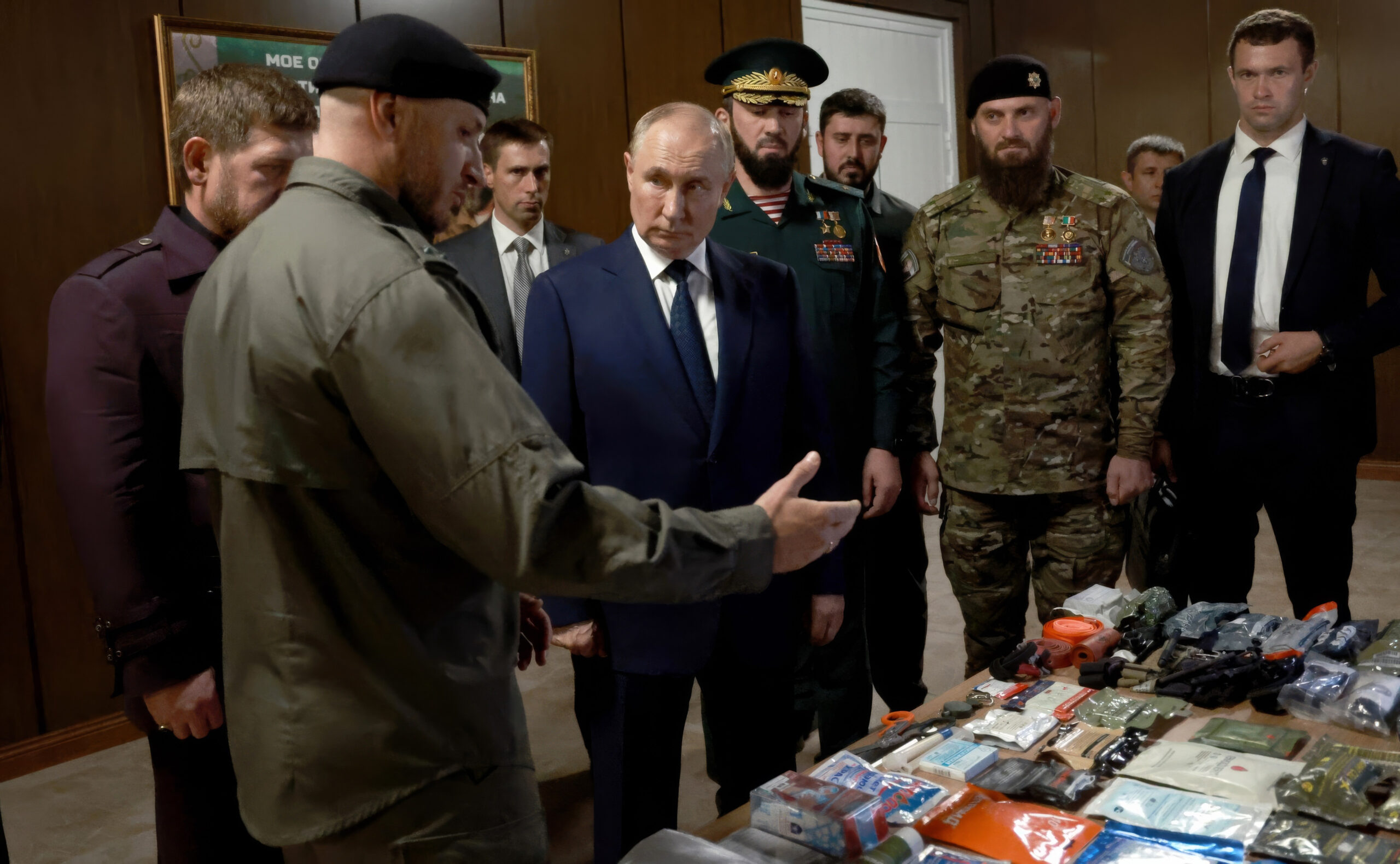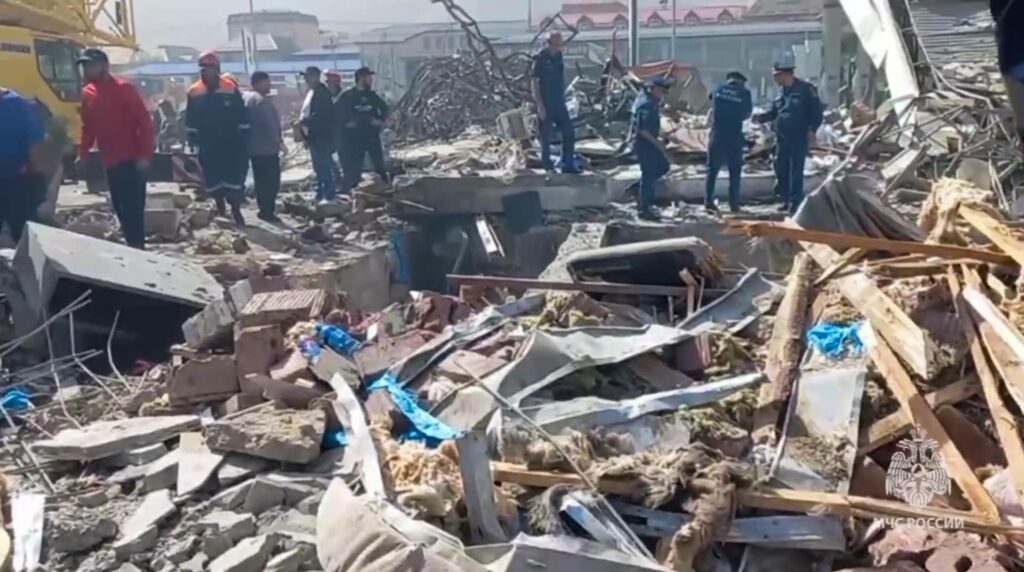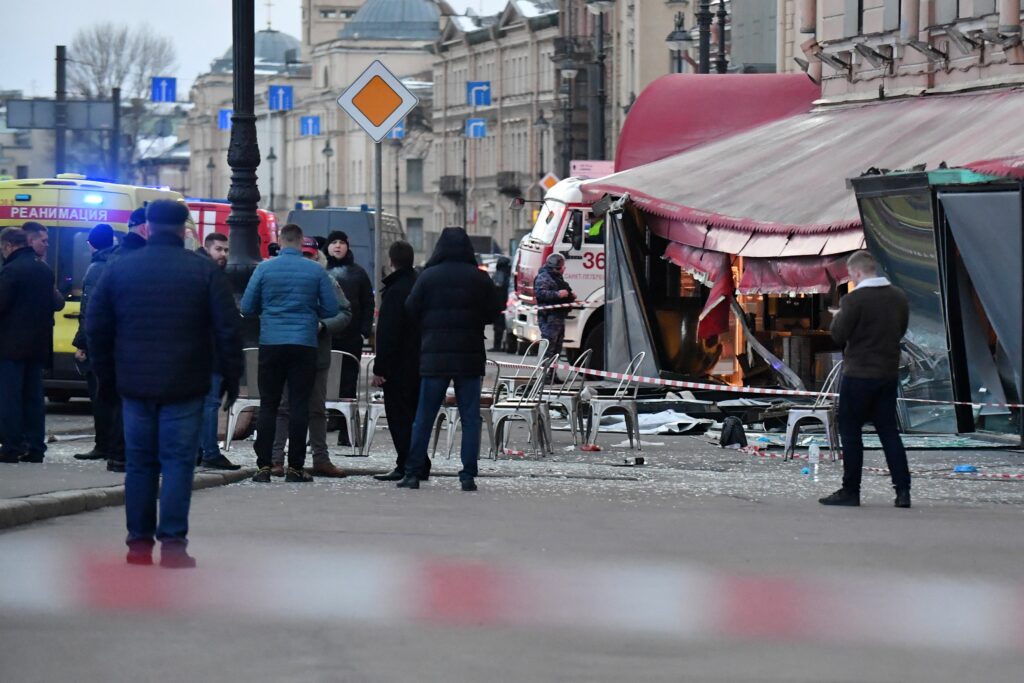Shootings by agents in Moscow; territorial encroachment; mass kidnappings; rising interethnic tensions; militant attacks. That is how events have transpired for the North Caucasus between President Putin’s first regional visit in years this August, and his birthday on October 7 (also the anniversary of Anna Politkovskaya’s assassination.)
Ramzan Kadyrov’s October 9 speech to security sector leaders indicated that instability could continue. Addressing senior commanders, who at times seemed unnerved, Kadyrov laid out plans for escalation on two fronts. First, he announced that any youths deemed problematic by the regime will be joining the invasion of Ukraine. Second, he declared a blood feud against the Dagestani senator and oligarch Suleiman Kerimov and his associates, over an alleged assassination plot. Kadyrov’s speech highlights how tensions are high in the region, with the Kremlin exacerbating them directly or through non-action.
Putin visits
At the end of August, Putin traveled to the main North Caucasus republics for the first time in years. Of particular note were his excursions to Beslan School #1, the site of the 2004 attack he never visited previously, and to Chechnya, which he last traveled to in 2011. One would think this trip would remind Putin of the region’s past troubles and their causes, but his actions since prove quite the opposite. After this trip, events in the North Caucasus progressed rapidly.
The most immediate effect was the series of abductions in Chechnya, documented by opposition movements NIYSO and 1ADAT, with criminal cases created to force the kidnapped to sign contracts for deployment. The timing of the increased abductions suggests Putin ordered Kadyrov to contribute more men to the military. Such a policy also partially explains Kadyrov’s recent announcement threatening youths with forced deployment. Conducting abductions is also a way for the kadyrovtsy to attempt to assert their authority amidst a number of failures.
Is Kadyrov floundering domestically?
Putin was greeted in Chechnya with a neon green sign reading «We need sharia.» A few days later, «NIYSO» was graffitied on the back wall of a police station in Gudermes. There are no reports that those behind these acts of protest have been found, despite raids. Similarly, earlier this year, the kadyrovtsy struggled to discover the identity of whoever burned a car with Adam Kadyrov (the door was marked with the letter «K13», tacitly reserved for people connected to Adam Kadyrov, and instead of a license plate, the plate read — DUSTUM). These actions comprise a trend of growing willingness to express opposition to the regime, and to do so in ways that can evade the kadyrovtsy.
October 5, Kadyrov’s birthday, was marked by a militant attack on a police station in Gudermes. Bystanders report how a grenade explosion resulted in multiple casualties, although details vary. Despite days of checking everyone entering orleaving Gudermes, the kadyrovtsy have yet to identify and locate the attacker (s).
Since the end of 2021, Chechnya’s populace has increasingly demonstrated a willingness to protest the Kadyrov regime. Further, these acts are increasingly evading the kadyrovtsy. This domestic trouble, plus wartime pressures, is driving Kadyrov to try to violently achieve a victory in the Wildberries dispute. Afterall, his reputation as a fixer is at stake if he loses.
Business and territorial encroachment
Ingushetia finds itself trapped in the middle of both business and land disputes. In the fight for Wildberries, Kerimov has acted through his associates Ingush MP Bekkhan Barakhoev and Dagestani MP Rizvan Kurbanov. A shootout at the Wildberries headquarters in Moscow resulted in kadyrovtsy killing two Ingush security guards. Surprisingly, Kadyrov has threatened Kerimov, Barakhoev, and Kurbanov with a blood feud. All levels of Dagestani society have voiced support for Kerimov in response. That those killed thus far were Ingush and the republic’s lesser leverage against Kadyrov have placed the focus on the republic as the higher risk for unrest, despite Dagestan’s greater involvement in the conflict.
Territorially, North Ossetia attempts to redraw their shared border, despite a moratorium on discussing this matter until 2030. While some commentators emphasized that such claims occur almost every year, that would not explain why so many ministers, although not Governor Kalimatov, have publicly opposed this year’s claims by North Ossetia. That North Ossetia’s actions violate the moratorium suggests some level of support from Moscow. There is precedent for Moscow giving away Ingushetia’s territory, as they did in 2018. Despite regional ministers clearly opposing a repeat of this, there is nothing to indicate that there is political will in the Kremlin to change strategies, so a secret deal remains a possibility, despite its guarantee of instability.
The confluence of these threats is that both could mobilize Ingush society. The authorities warned the public against such action. Were they to protest en masse, Kadyrov has laid the groundwork to exploit the situation to intervene. He coopted the Batalkhadzintsy, finally acquiring an actor that, at least previously, held a semblance of influence in the neighboring republic—although they opposed his 2018 annexation, they would be unlikely to repeat this. Further, Ingushetia recently deployed at least a part of its SOBR siloviki to Ukraine and Kadyrov has previously threatened to invade Ingushetia if the authorities were unable to restore order. While the business tussle can avoid interethnic conflict, land disputes may not.
Counterterrorism through belligerent nationalism
As if the region was not already sufficiently combustible, the nationalist movement «Russkaya Obshchina» moved into the region at the beginning of October. Long having a presence in southern Russia, the group is known for stoking xenophobia against natives of Central Asia and the North Caucasus and cooperating with the security services. Now, they have launched regional chapters in Cherkessk, Grozny, Kislovodsk, Makhachkala, Nalchik, Pyatigorsk, and Vladikavkaz.
Their initial strategies are extremely inflammatory: planning to patrol the streets and raid mosques with the Interior Ministry, seeking to close mosques, referring to Caucasus natives as «Nazis» and «Wahhabists», and naming their regional movement for General Yermalov, the tsarist general who conquered the Caucasus and is despised locally. Importantly, Russkaya Obshchina’s actions thus far have been in the Northwest Caucasus, places where the authorities have increasingly repressed public displays of Circassian national identity.
Tensions between Moscow and local authorities are showing. Russian Security Council Secretary Sergei Shoigu previously warned of attempts to spread sharia norms in the region, also claiming that the West was fomenting separatism with emigrant and nationalist movements. Religious policy and the management of interethnic relations as part of counterterrorism policy have been ill-conceived and poorly executed. The Kadyrov regime has publicly opposed Moscow’s policies. Mansur Soltaev, Kadyrov’s alleged human rights ombudsman, requested the Interior Ministry clarify its relationship with Russkaya Obshchina. Apti Alaudinov accused the FSB of operating the group. Kadyrov himself criticized the anti-migrant crackdowns—conducted in the name of counterterrorism and sending men to fight in Ukraine—calling for them to stop.
Russkaya Obshchina are also bringing attention to a legal double-standard. They ran around in balaclavas while niqabs were banned for hiding one’s identity. Their open provocation of interethnic and interconfessional prejudice results in no consequences, while those who make comparable comments about Christians are detained and face criminal charges. This double-standard will continue to exacerbate tensions as Russkaya Obshchina’s tactics escalate.
Converging problems
The October 11 Ingushetia attack on members of the Center for Countering Extremism (CCE) exemplifies how all of the current disputes intersect, heightening the risk of conflict. Three militants fired upon a vehicle carrying the deputy head of Ingushetia’s CCE, Adam Khamkhoev, and his guards, killing the latter. The militants escaped, abandoning and burning their initial car on the outskirts of Maiskii, North Ossetia, before fleeing in another vehicle. There is as yet no concrete evidence to establish motive or attribution.
Despite this lack of information, some media have attempted to sow their own narratives into reporting. The claim that killing Khamkhoev was the goal—he has previously been targeted multiple times—and emphasis on his connection to the previous CCE head, Ibragim Eldzharkiev, implicate the Batalkhadzhintsy brotherhood. Having mostly fled Ingushetia over the past few years, Kadyrov gave them refuge, so these assertions also feed into the Wildberries dispute.
On the other hand, some outlets report the CCE officers were conducting raid activities, which triggered their being fired upon. This story prioritizes no motive or organization. That the assailants seemingly planned a relay car to ferry them into hiding only indicates the attack was planned, but nothing to establish that they had prior knowledge these high-ranking officials would be at this specific gas station along a major highway.
While details of this attack continue to emerge, regional tensions continue to be poorly assuaged, if at all. The Kremlin has allowed the North Caucasus’ politics to reach this fever pitch, while showing an inclination only to contribute to problems as they emerge, not prevent them. Officials’ intentions are difficult, if not impossible, to know, but there is no charitable way to interpret Moscow’s recent actions.










